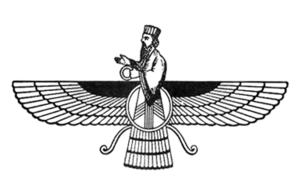Zoroastrismo
| Zoroastrismo |
|---|
| instantia de: religion |
| subclasse de: dualistic cosmology[*] |
| parte de: Iranian religions[*] |

|
|
|
| Commons: Zoroastrianism |
Zoroastrismo[1] [zo-ro-a-strì-smo], etiam nominate Zarathustraismo, Mazdaismo e Magianismo, es un religion Iranian e un philosophia religiose, e le prime religion monotheistic in le mundo. Il esseva le religion de stato del imperios Achaemenid, Parthian e Sasanian. Estimatives del numero actual de Zoroastrianes in le mundo varia inter 145.000 e 2,6 milliones.
Zoroastrismo nasceva in le region oriental del Imperio Persian, quando le philosophe religiose Zoroastre simplificava le pantheon de deoses Iranian antique in duo fortias opponente: Spenta Mainyu (mentalitate progressive) e Angra Mainyu (mentalitate destructive) sob le Deo uno, Ahura Mazda.
Le ideas de Zoroastre induceva a un religion formal portante su nome circa le 6º ceculo a.C. e ha influenciate alter religiones posterior includente Judaismo, Gnosticismo, Christianismo e Islam.
Vista General[modificar | modificar fonte]
In Zoroastrismo, le creator Ahura Mazda es omne benevolente, e necuno mal se origina de illo. Ita, in Zoroastrimo bene e mal habe origines distincte, cum le mal (Druj) tentante destruir le creation de Mazda (Asha), e le bene tentante sustentar lo. Etiam si Ahura Mazda es non immanente in le mundo, su creation es representate per le Amesha Spentas e le hoste de alter Yazatas, per quem le operas de Deo es evidente pro humanitate, e per quem adoration de Mazda es ultimamente dirigite. Le textos plus importante de le religion es illos del Avesta, de qual un significante portion ha essite perdite, e generalmente solmente le liturgias del qual ha supervivite. Le portiones perdite es cognocite solmente per referentias e breve citationes in le obras posterior, primarimente del 9° al 11° seculo.
In alcun forma, il serviva como le religion national o de stato de un portion significante del populo Iranian per multe seculos. Le religion prime diminuiva quando le Imperio Achaemenid esseva invadite per Alexandre Magno, post que il collapsava e se disintegrava e il esseva plus ultra gradualmente marginalizate per Islam del 7° seculo avante cum le declinio del Imperio Sassanid. Le poter politic del dinastias Iranian pre-Islamic prestava immense prestigio al Zoroastrismo in tempos ancian, e alcun de su doctrinas principal esseva adoptate per alter sistemas religiose. Il habe necuno divisions theologic major (le solo schisma significant es baseate in differentias de calendario), sed il non es uniforme. Influentias del era moderne habe un impacto significante in credentias individual e local, practicas, valores e vocabulario, interdum infusionante cum le tradition e in alter casos lo dislocante.
Bibliographia[modificar | modificar fonte]
- Kulke, Eckehard: The Parsees in India: a minority as agent of social change. München: Weltforum-Verlag (= Studien zur Entwicklung und Politik 3), ISBN 3-8039-00700-0
- Ervad Sheriarji Dadabhai Bharucha: A Brief sketch of the Zoroastrian Religion and Customs
- Dastur Khurshed S. Dabu: A Handbook on Information on Zoroastrianism
- Dastur Khurshed S. Dabu: Zarathustra an his Teachings A Manual for Young Students
- Jivanji Jamshedji Modi: The Religious System of the Parsis
- R. P. Masani: The religion of the good life Zoroastrianism
- P. P. Balsara: Highlights of Parsi History
- Maneckji Nusservanji Dhalla: History of Zoroastrianism; dritte Auflage 1994, 525 p, K. R. Cama, Oriental Institute, Bombay
- Dr. Ervad Dr. Ramiyar Parvez Karanjia: Zoroastrian Religion & Ancient Iranian Art
- Adil F. Rangoonwalla: Five Niyaeshes, 2004, 341 p.
- Aspandyar Sohrab Gotla: Guide to Zarthostrian Historical Places in Iran
- J. C. Tavadia: The Zoroastrian Religion in the Avesta, 1999
- S. J. Bulsara: The Laws of the Ancient Persians as found in the "Matikan E Hazar Datastan" or "The Digest of a Thousand Points of Law", 1999
- M. N. Dhalla: Zoroastrian Civilization 2000
- Marazban J. Giara: Global Directory of Zoroastrian Fire Temples, 2. Auflage, 2002, 240 p, 1
- D. F. Karaka: History of The Parsis including their manners, customs, religion and present position, 350 p, illus.
- Piloo Nanavatty: The Gathas of Zarathushtra, 1999, 73 p, (illus.)
- Roshan Rivetna: The Legacy of Zarathushtra, 96 p, (illus.)
- Dr. Sir Jivanji J. Modi: The Religious Ceremonies and Customs of The Parsees, 550 Seiten
- Mani Kamerkar, Soonu Dhunjisha: From the Iranian Plateau to the Shores of Gujarat, 2002, 220 p
- I.J.S. Taraporewala: The Religion of Zarathushtra, 357 p
- Jivanji Jamshedji Modi: A Few Events in The Early History of the Parsis and Their Dates, 2004, 114 p
- Dr. Irach J. S.Taraporewala: Zoroastrian Daily Prayers, 250 p
- Adil F.Rangoonwalla: Zoroastrian Etiquette, 2003, 56 p
- Rustom C Chothia: Zoroastrian Religion Most Frequently Asked Questions, 2002, 44 p
